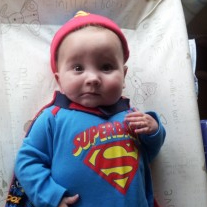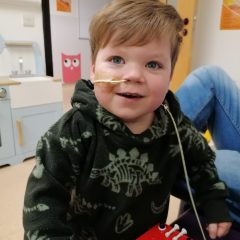Laura’s first scan
When Laura found out she was pregnant, she felt so sure she was having a baby girl that she began buying pink outfits at just eight weeks.
Her 12 week scan showed the baby clearly. However, the baby was very active, making it difficult to measure the back of the neck. “It was almost like someone stopped [the measurement of the back of the neck] from happening”, Laura remembers.
Subsequent scans
At 18 weeks Laura arranged for a private gender scan – the baby was indeed a girl! But the 4D picture wasn’t clear, so it was arranged to try again in two weeks’ time for a clearer image.
A fortnight passed and Laura returned for a 20 week scan. All was going well at first, but then the person taking the scan stopped talking to them. They explained that there was a major problem, and called the hospital immediately.
What was happening?
The company provided Laura with notes to take to the hospital. The scan had shown a problem with the occipital part of the baby’s skull – with the bone which forms the back and base of the skull and encircles the spinal cord.
Laura and her family spent the whole weekend looking for answers online, but unable to find anything, were left feeling confused.
Laura remembers calling maternity services. Aberdeen would be able to fit her in in a fortnight, or if they could travel, Inverurie had space that Tuesday.
The family travelled to Inverurie.
There, they watched their little girl on the screen waving her arms and jumping around. A scan revealed that their baby had encephalocele, a sac-like protrusion of the brain and the membranes that cover it through an opening in the skull. Laura was told that the condition was incompatible with life.
“I was offered to phone the ward when I was ready. It would be a needle through the baby’s heart, as I was almost 21 weeks pregnant” recalled Laura.
Before she found out she was pregnant, Laura had been going through a very difficult time. “The day I found out I was pregnant was also the day I was about to give up. I prayed for someone to save me”. For Laura, her positive pregnancy test was the someone she had prayed for. Excitement grew and life had a real purpose. Laura thought back to that prayer she had made. “I wasn’t going to end someone’s life when they had saved mine”.
And so the family began to fight.
Research, Research, Research
Laura researched all the hospitals in the UK and their neurosurgeons. She started emailing and collecting their responses as she started to fight for her daughter’s life.
Laura’s mum contacted Spina Bifida Hydrocephalus Scotland. The charity put Laura in touch with a woman called Sophie, who now accompanied her to appointments and scans. “She was a truly supportive and positive influence” remembers Laura. Sophie helped with a referral to the Royal Hospital for Children, Glasgow.
Laura goes to Glasgow
Laura’s baby, now named Libby, would need to be delivered by caesarean section. The Glasgow medical team planned for Libby’s delivery and put in place a post-delivery plan for surgery to Libby’s head. Laura kept herself realistic about Libby’s chances of survival, as well as her long-term developmental needs.
“I promised myself the night before my C-section I wasn’t going to cry. I didn’t want my memories of Libby’s last moments alive feeling sad”. Laura didn’t feel excited about the birth. Instead it felt like their journey together was coming to an end.
Laura went in for her C-section and she needed to go under general anaesthetic – “which I didn’t want to wake up from”.
 That evening
That evening
Laura woke in the late evening, crying. Libby was nowhere in sight. But Laura’s mum was there, telling her that Libby was alive! Laura couldn’t believe it.
But precious Libby had made it into the world. With her encephalocele she weighed 8lbs 12 oz. Libby was re-weighed at 6lbs 9oz after her operation to remove part of it.
The encephalocele started to go necrotic as the tissue died. The medical team prepared for another operation to remove it completely.
“We were told that there was a high chance of losing Libby. We all sat in the room at Ronald McDonald House Glasgow waiting for the call”.
The call came
Libby had sailed through her operation! She had needed a blood transfusion and part of her cerebellum and brain stem had needed to be removed. They too had gone necrotic.
Libby stayed in Glasgow for four weeks before being transferred back to Aberdeen. The team there monitored Libby for a further week before discharging her at 5 weeks old – the family could go home.
 A long road ahead
A long road ahead
Various tests have shown that Libby has a multitude of health concerns. Laura takes this all in her stride. “The most important thing is that Libby is alive and receiving the love and attention she deserves as an infant” Laura enthused.
Here at Ronald McDonald House Glasgow we often hear of miracle babies. Libby is certainly one such baby! Thanks to the dedication of her mum, Laura and the incredible health professionals, Libby celebrated her first birthday last year.
“We all sat in the room at Ronald McDonald House Glasgow waiting for the call”
Laura’s comment brings it home just how important the space the House provides families truly is. Each of our 31 bedrooms has a phone which is connected to the hospital’s system, providing a direct link from room to ward.
You can support families like Libby’s by donating today – thank you.
Back to Stories


